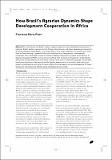| dc.contributor.author | Pierri, Francesco Maria | en |
| dc.date.accessioned | 2016-01-06T15:03:25Z | |
| dc.date.available | 2016-01-06T15:03:25Z | |
| dc.date.issued | July 2013 | en |
| dc.identifier.citation | Pierri, F., M. (2013) How Brazil's Agrarian Dynamics Shape Development Cooperation in Africa. IDS Bulletin 44(4): 69-79 | en |
| dc.identifier.issn | 1759-5436 | en |
| dc.identifier.uri | https://opendocs.ids.ac.uk/opendocs/handle/20.500.12413/7434 | |
| dc.description.abstract | This article shows how Brazil's history of agrarian dynamics shapes development cooperation. In particular, Brazil's dualistic agrarian structure frames policy discourse, and shapes development cooperation thinking and practice. Given Brazil's recent experience of rural poverty reduction, the article argues that a focus on ‘family farming’ is potentially the most productive form of engagement in development cooperation. This is illustrated through an analysis of Brazilian cooperation promoted by the Ministry of Agrarian Development (MDA), and in particular its More Food International Programme. While Brazilian family farms are very different to those found in Africa, there can be a productive exchange of experience, expertise and equipment. Key lessons from the Brazilian experience are the need for state backing and support, providing social security for the poor, offering financial support and technical expertise for family farming and the existence of effective social mobilisation by civil society. | en |
| dc.format.extent | 11 | en |
| dc.publisher | Blackwell Publishing Ltd | en |
| dc.relation.ispartofseries | IDS Bulletin Vol. 44 Nos. 4 | en |
| dc.rights.uri | http://www.ids.ac.uk/files/dmfile/IDSOpenDocsStandardTermsOfUse.pdf | en |
| dc.title | How Brazil's Agrarian Dynamics Shape Development Cooperation in Africa | en |
| dc.type | Article | en |
| dc.rights.holder | © 2013 The Author. IDS Bulletin © 2013 Institute of Development Studies | en |
| dc.identifier.doi | 10.1111/1759-5436.12043 | en |

